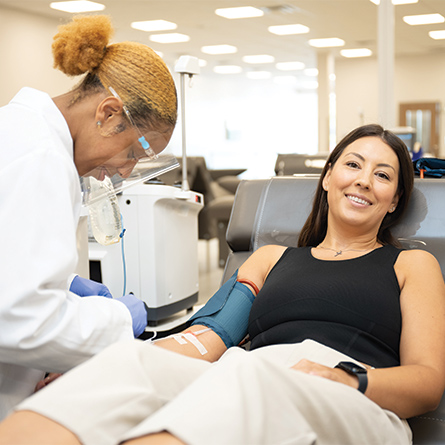BECOME A DONOR.
IMPACT LIVES.
Plasma Donation Can Be the Lifeline for People with Rare Conditions and a Rewarding Experience for You.
What is Plasma?
Plasma is the largest component of human blood, consisting of water, salts, enzymes, antibodies, and proteins. Its primary function is to distribute cells and essential substances throughout the body, ensuring every cell receives the necessary resources for survival.
The unique proteins and antibodies in plasma are crucial for the immune response and disease prevention, as they fight infections and neutralize pathogens. This makes plasma invaluable for developing life-saving therapies for serious conditions, including treatments for immune deficiencies, rare chronic conditions, and rare diseases.

How Does the Donation Process Work?
We aim to make your donation experience as comfortable as possible by providing a quality environment and exceptional services. Here’s what you need to know about plasma donation requirements and what to expect on your first visit.
Screening
- Provide proof of identification
- A brief screening and health history are conducted
- Samples are drawn to ensure eligibility
Physical Exam
- Prior to the first donation, a physical exam is conducted to ensure you are healthy
- The exam is repeated annually thereafter
Donation
- Plasma is collected using an FDA-cleared automated plasma collection machine
Compensation
- Get rewarded for time spent on each donation
- Earn up to $700 during the first month as a new donor
*Varies by location and is subject to change
Donor Eligibility Requirements
Be 18 years of age or older
Be in good health
Weigh at least 110 pounds
Have a valid government issued ID, proof of address and SSN
All other donor eligibility criteria must be met

Why Donate Plasma?
Donating plasma offers a meaningful opportunity to make a lasting impact on the lives of those in need. The unique proteins and antibodies in plasma cannot be synthesized artificially, making each donation invaluable to treatment development. By giving plasma, donors contribute directly to patients with immune deficiencies, bleeding disorders, and other serious conditions, helping them lead fuller, healthier lives.
Frequently Asked Questions
- What is plasma?Plasma is the largest component of human blood, consisting of water, salts, enzymes, antibodies, and proteins. Its primary function is to distribute cells and essential substances throughout the body. Plasma plays a critical role in immune response and disease prevention, making it essential for various medical therapies.
- What are plasma donations used for?Plasma is vital in treating various rare and chronic conditions such as immune deficiencies, and bleeding disorders as well as in the treatment of specific conditions including RH incompatibility, animal bites, trauma, burns, shock, and organ transplants. Furthermore, rare blood products are crucial for producing medications and blood typing reagents essential for identifying blood types and ensuring compatibility before transfusions. Unfortunately, there is currently a shortage of committed donors in the medical community.
- Is plasma donation safe?Yes. Our skilled medical team conducts plasma donation in controlled and sterile facilities, with safety and comfort top of mind.
- Is plasma donation painful?Most donors find that the initial needle prick feels like a routine blood draw, and that this sensation quickly fades. Apart from that, the process should be painless.
- How long does a plasma donation take?During your first donation, plan on spending approximately two hours at the plasma center. You will undergo a preliminary health screening and a physical examination before your first donation, with subsequent annual physicals to safeguard both your health and that of the recipient. Your donation will be collected using an FDA-cleared automated plasmapheresis machine, which separates the plasma from the red blood cells before returning the red blood cells to you.
- How long does plasma donation take if it's not my first time donating?The duration can vary depending on factors such as your weight, vein condition, hydration, the efficiency of the phlebotomy process, and pump speed. Generally, the donation takes about 45 minutes.
- Will I be rewarded for donating plasma?At Kamada Plasma, every donation is valued. Once a prospective donor becomes eligible, they are compensated for the time they spend donating. The amount of compensation is based on program eligibility. If you are a new donor, you can earn up to $700 during the first month. *Compensation varies by location and is subject to change
- How often can I donate?The guidelines for the frequency of donations are set by the Food and Drug Administration. Generally, you can donate plasma twice within a seven-day period, ensuring there is a minimum of 48 hours between donations.
- Are the requirements for regular plasma donation different from those for specialty plasma programs?Yes. To participate in the specialty programs, you must have a specific blood type or be immunized to produce the required antibodies. Our centers will check your blood to determine your eligibility.
- Can I donate for both normal source and specialty plasma programs?No, each donor can only participate in one of the programs.